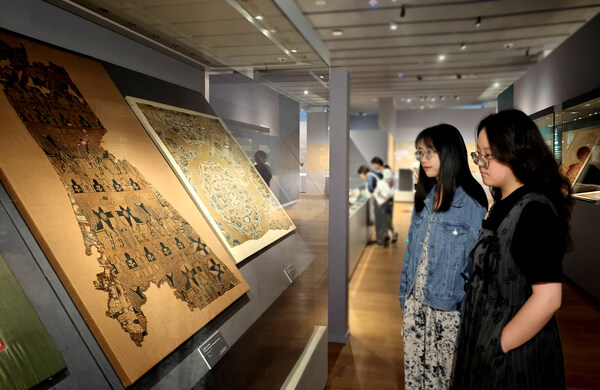Curated by teachers and students, exhibition of Asian Civilizations on Silk Roads opens at Zhejiang University
Mon, 20 May 2024 21:45:00 +0800
HANGZHOU, China, May 20, 2024 /PRNewswire/ -- The exhibition Communication and Innovation: Asian Civilizations on The Silk Road inaugurated at Zhejiang University Museum of Art and Archaeology on May 10, 2024, is curated by the professors and students of the School of Art and Archaeology of Zhejiang University and will last until August 10, 2024. The exhibition brings together more than 210 pieces of artifacts from five museums, mainly from Hirayama Ikuo Silk Road Museum in Japan, and Shaanxi Archaeological Museum in China. These artifacts dated back to between 3300 BC and AD 1800, show the emergence and development of Asian civilizations, and the mutual learning among them.

The exhibition "Communication and Innovation: Asian Civilizations on The Silk Road" opens at Zhejiang University
The exhibition is organized into three parts. The first part introduces the three cradles of human civilizations that originated in Asia, the Mesopotamian Civilization, the Indus Valley Civilization and the Chinese Civilization, through three aspects, mode of production, brief and symbols. The second part, named 'Objects and Art', shows the exchange of goods and the mutual borrowing of technology and artistic styles among different regions along the Silk Roads, particularly through metalwork, silk, ceramics, glass, and religious art. In the process of mutual learning, new techniques and styles are further developed. The third part, called 'City and People', presents how the four cities Baghdad, Samarkand, Chang'an, and Heiankyo, played the role as the hubs along the Silk Roads between the 7th and 10th centuries and witnessed the intersection of innovation, where international people exchanged products, knowledge and ideas, and create new ones. Compared to the exhibitions with the similar theme, this exhibition emphasizes more on the connections and interactions among Asian regions or cultures, rather than the uniqueness of particular Asian countries or cultures.
The executive curator Dr Yi Fu said, more than 40 students majored in heritage and museum studies from the School of Art and Archaeology of Zhejiang University participated in the whole process of curating this exhibition, under the guidance of tutors. A roundtable discussion was held to discuss this exhibition after the opening of the exhibition, when the international museum professionals from Britain, France, Italy, Russia and South Korea shared their positive comments on the exhibition and the teaching-learning process in this practical curation project.
 Homepage
Homepage